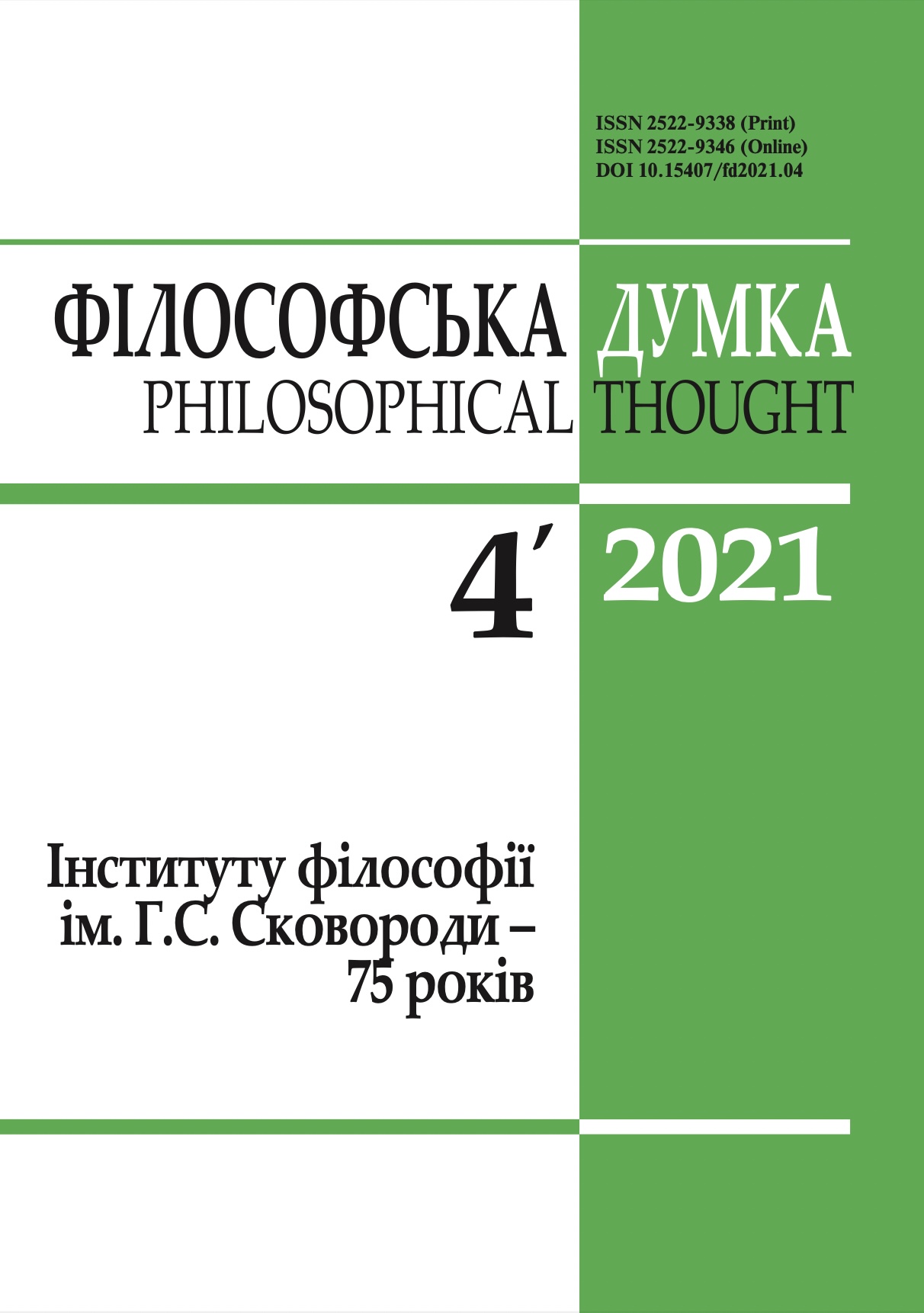INSTITUTE OF PHILOSOPHY: TRADITIONS AND INNOVATIONS
Articles: Institute of Philosophy and Philosophy in Ukraine
Keywords:
history of philosophy, Hryhorii Skovoroda Institute of Philosophy, philosophical traditions, scientific and research activity, researcher's responsibilityAbstract
The article is devoted to the historical and philosophical analysis of the unique and paradigmatic role of the H.S. Skovoroda Institute of Philosophy, National Academy of Sciences of Ukraine in the philosophical life of Ukraine for 75 years since its foundation. The authors outline its role in the process of institutionalizing philosophy in Ukraine from the time of the domination of the dogmas of Soviet Marxism to the introduction of current research traditions in modern Ukrainian philosophy. The continuity and peculiarities of the change of generations of researchers in the field of philosophy and the involvement of Ukrainian philosophical thought in the world intellectual discourse are studied.
The article's authors reveal the gradual formation of the Kyiv philosophical tradition, the role of the Institute's leadership in the style and nature of scientific research of certain periods. Particular attention is paid to the institutionalization of new research areas at the Institute, such as political philosophy, philosophy of language and speech, which belong to the leading paradigm of modern philosophy. Attention is paid to the cooperation of the Institute with domestic scientific and educational institutions, its international relations. The status of the leading professional publications, which became significant both in Soviet times and during independence, is highlighted. Finally, the article notes the role and tasks of the Institute in modern social discourse, focuses on the values, the preservation of which is taken care of by representatives of the Institute.
References
From Vyshenskyi to Skovoroda (from the history of philosophical thought in Ukraine in the XVI–XVII centuries) (1972). [In Ukrainian]. Kyiv: Naukova dumka.
Drach, I.F., Krymskyi, S.B., Popovich M.V. (1984). Hrygorii Skovoroda. [In Ukrainian]. Kyiv: Molod’.
Yolon, P. (2016). Significant role of Pavlo Kopnin in the critical period for activities of the Institute of Philosophy (Article one). [In Ukrainian]. Philosophical Thought, 6, 54–66.
Lisovyi, V. (2014). Memoirs. Poetry. [In Ukrainian]. Kyiv: Smoloskyp.
Popovich, M.V. (1971). Logic and scientific knowledge. [In Ukrainian]. Kyiv: Naukova dumka.
Popovich, M.V. (1975). Philosophical questions of semantics. [In Russian]. Kyiv: Naukova dumka.
Skovoroda, H. (1961). Works: In 2 vols. [In Ukrainian]. Kyiv: USSR Academy of Sciences.
Skovoroda, H. (1973a). Complete collection of works: In 2 vols. [In Ukrainian]. Kyiv: Naukova dumka.
Skovoroda, H. (1973b). Works in two volumes. [In Russian]. Moscow: Mysl’.
Skovoroda Hryhorii: Research, exploration, materials (1992). (V. Nichik, J. Stratiy, Comp.). [In Ukrainian]. Kyiv: Scientific opinion.
The Phenomenon of Ukrainian Culture (1996). (V.I. Shynkaruk, Ed.). [In Ukrainian]. Kyiv: Feniks.
Philosophical Dictionary (1973; 2nd ed. 1986). (V.I. Shinkaruk, Ed.). [In Ukrainian]. Kyiv: URE Main Editorial Office.
Philosophical Encyclopedic Dictionary (2002). (V.I. Shynkaruk, Ed.). [In Ukrainian]. Kyiv: Abris.
Man and the human world. Categories "man" and "world" in the system of scientific worldview (1977). (V.I. Shinkaruk, Ed.). [In Russian]. Kyiv: Naukova dumka.
Shynkaruk, V.I., Yatsenko, A.I. (1984). Humanism of the dialectical-materialist worldview. [In Russian]. Kyiv: Politizdat.
Downloads
-
PDF (Українська)
Downloads: 254
Published
How to Cite
Issue
Section
License
Authors who publish with this journal agree to the following terms:
- Authors retain copyright and grant the journal right of first publication.
- Authors are able to enter into separate, additional contractual arrangements for the non-exclusive distribution of the journal's published version of the work (e.g., post it to an institutional repository or publish it in a book), with an acknowledgement of its initial publication in this journal.
- Authors are permitted and encouraged to post their work online (e.g., in institutional repositories or on their website) prior to and during the submission process, as it can lead to productive exchanges, as well as earlier and greater citation of published work (See The Effect of Open Access).


